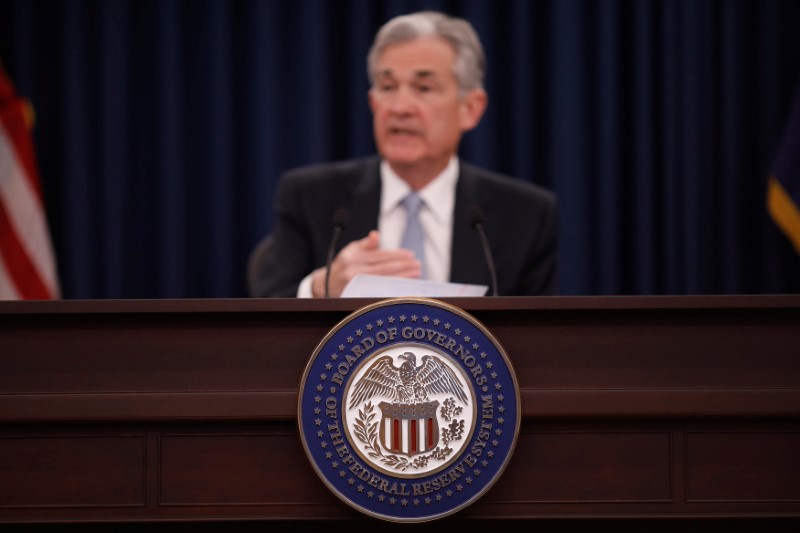By Lindsay Dunsmuir
WASHINGTON (Reuters) - The U.S. Federal Reserve is set to hold interest rates steady this week but will likely further encourage expectations that it will lift borrowing costs in June on the back of rising inflation and low unemployment.
Investors have all but priced out the chance of a rate hike at the end of the Fed's two-day policy meeting on Wednesday, particularly given its adherence in recent years to only raising rates at meetings that are followed by press conferences.
The central bank is due to announce its decision at 2 p.m. EDT (1800 GMT) on Wednesday. Fed Chairman Jerome Powell is not scheduled to hold a press conference.
"Fed speakers have done little to push back against this expectation ... we expect no fireworks," JPMorgan (NYSE:JPM) economist Michael Feroli said in a note to clients.
The Fed raised its benchmark overnight lending rate at its March 20-21 meeting by a quarter percentage point to a target range of between 1.50 percent and 1.75 percent.
It currently forecasts another two rate rises this year, although an increasing number of policymakers see three as possible. The Fed's next policy meeting after this week is scheduled for June 12-13. Investors overwhelmingly see a rate hike then.
The pace of rate increases has picked up since the central bank began its tightening cycle in December 2015. It raised rates once in 2016, but lifted borrowing costs three times last year amid a strengthening economy.
Unemployment is at a 17-year low of 4.1 percent and the Trump administration's tax cuts and fiscal stimulus are expected to further juice the economy.
(For a graphic on Fed targets click https://tmsnrt.rs/2vXUR4J)
RISING INFLATION PRESSURES
Ahead of this week's meeting, Powell has stuck to flagging a middle-of-the-road approach on rate increases in the face of data showing the robust economy had not yet triggered a jump in inflation.
Data on Monday, however, showed that price gains are now near the Fed's 2 percent target.
The Fed's preferred measure of inflation soared 1.9 percent in the 12 months through March, the biggest increase since February 2017, after increasing 1.6 percent in the year through February, the U.S. Commerce Department reported.
"The real headache is that it is easy to be the Fed when inflation is below target ... a very important aspect as we go into this May meeting, is the tone of the debate changes completely as we get to 2 percent and beyond," said Torsten Slok, an economist at Deutsche Bank (DE:DBKGn).
Other data last week showed that while U.S. economic growth slowed to an annualized rate of 2.3 percent in the first quarter, wages and salaries shot up 0.9 percent during the same period. That was the largest increase since the first quarter of 2007.
Fed policymakers have also been wary about the potential negative impact of the Trump administration's protectionist trade policies.
A U.S. trade delegation is expected to meet Chinese officials in Beijing on Thursday and Friday after weeks of tensions between the world's two largest economies.
President Donald Trump has proposed imposing tariffs on $50 billion in Chinese exports and threatened to slap them on another $100 billion in Chinese goods. China, in response, has said it will impose its own tariffs on American products.

However, few economists expect any mention of trade risks in the Fed's policy statement on Wednesday and see any tweaks as likely to be confined to upgrading the language on inflation to reflect that it is now effectively at target.